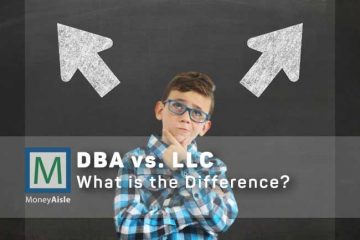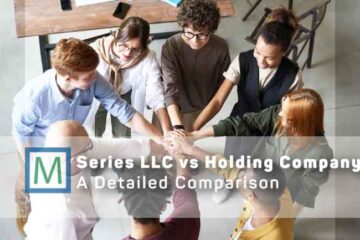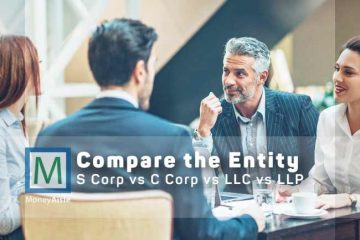An LLC, or limited liability company, is an increasingly popular business structure that offers several key benefits to its owners. Knowing the LLC ownership structure helps business owners to take full advantage of this entity and make decisions accordingly.
This guide will provide a brief overview of the basics of LLC ownership structure, including how it works and the advantages it provides. So, let’s get started.
Important
While starting a new venture, many entrepreneurs and business owners get lost in the complex jargons related to business and finance. Due to many similarities in different business structures, many of them end up picking the wrong entity.
Therefore, we have compiled the side by side comparison of 4 types of business structures that are important. However, if you also seek limited liability protection, read S Corp vs C Corp vs LLC vs LLP.
Who are LLC Owners?
LLCs are typically formed by one or more individuals who contribute capital to the business in exchange for an ownership stake. These individuals are called members of LLC. An LLC can be a single-member LLC or multi-member LLC, depending on the number of individuals contributing capital to the LLC formation and its operation.
These individuals have a “membership interest,” which gives them rights related to the management and operation of the LLC. These members may also be referred to as “owners” or “partners.”
Note: The only limitation that LLC members face is that they must be at least 18 years of age.
Unlike an S corporation and a sole proprietorship, there are no restrictions on the number, country of citizenship, or status of LLC owners. LLCs can be owned by one person or many. Moreover, organizations such as a corporation, a holding company, or another LLC can be an LLC members.
How to Become an LLC Owner/Member
An LLC is formed by submitting articles of organization to the state. To become an LLC member, you need to make a capital contribution to cover start-up and operational expenses. A capital contribution is an investment that an LLC member makes in the firm. This contribution can be in the form of services or capital of any amount.
The Ownership may or may not be equal in an LLC. Like different classes of shares in a C corporation, LLC members may have different voting rights based on their capital contribution and percentage of ownership.
The LLC members become partners in the profits and losses of the company. They are given the right to vote on member resolutions and participate in the management and decisions making process of the LLC’s affairs.
Types of LLC Ownership Contribution
To become an LLC owner/member, contributions are made in the form of:
- Cash,
- Property, or
- Services.
Each member’s contribution and roles are defined in the LLC operating agreement which is LLC bylaws. In addition to capital contribution and responsibilities, the operating agreement also outlines the profit allocation, percentage of ownership, and what will happen in the event of LLC dissolution or if a member chooses to leave the company.
Members who make non-cash contributions usually determine the market value of the service or property they contribute. It helps, later on, to decide the share in profit or loss of LLC.
Based on how you make the investment, the LLC ownership falls into two categories:
Equity Investment-Based LLC Ownership
In multi-member LLCs, equity investments are the most common way to become an LLC member and raise capital for the company. Business owners are usually inclined to equity-based ownership as it doesn’t need to be repaid.
Rather, the investors are given a part of the LLC’s earnings. Moreover, this method allows you to get well-qualified partners who can help in the company’s success.
As an LLC can not go public like corporations, LLC ownership is usually acquired through a private transaction with people you know. However, you can sell your LLC’s membership units in an open market if your company is operating as a publicly traded LLC.
Convertible Debt-Based LLC Ownership
In convertible debt, LLC management accepts a loan while agreeing on the term to convert the debt into equity in the future. So, unlike regular debt or loan, you may not worry to repay the investment, rather in the future, the debt is converted into equity.
So, while signing the agreement, both parties agree on a percentage at which the debt will be converted into equity after a specific time. For instance, the agreed percentage was 20% and the debt amount was $100,000, the equity at the time of conversion will be $120,000.
LLC Ownership Structure Vs LLC Management Structure
As we have discussed earlier the LLC ownership structure depends on the following factors:
- The number of Owners (Single-Member LLC vs Multi-Member LLC)
- How capital contribution is made (Equity-Based Investment vs Convertible Debt-Based Investment)
- Role in management and specific responsibilities in the company’s affairs (Member-Managed and Manager-Managed)
Depending on the size of the company and the burden of duties, LLC members decide how the company’s day-to-day affairs will be managed. This is a crucial step in the LLC formation and you must mention the management structure in your articles of organization.
Member-managed LLC
In a member-managed structure, all members have a say in the management and operation of the LLC. However, the voting power or responsibilities may be different for each member depending on the agreement among LLC members.
You can learn in detail about Member-Managed LLCs vs Manager-Managed LLCs in this article.
Manager-Managed LLC
In a member-managed structure, certain member/s may be appointed by other LLC members to manage and operate the LLC on behalf of all members. You may also hire a manager outside the company (non-member) to take care of managerial tasks.
Benefits of Opting LLC Ownership Structure
There are several key benefits associated with forming an LLC or becoming a member of an existing LLC.
Limited Liability Protection
All LLC owners enjoy limited personal liability for the debts and obligations of the LLC.
This means that, as long as they are not personally involved in activities that may harm the company, they cannot be held personally responsible for any financial losses or legal judgments against the business.
Flexible Management
An LLC offers a high degree of flexibility and customized management. Members can decide how much involvement to take in running their business and what their rights and responsibilities will be.
They can choose to have managers run the day-to-day operations, or they can play an active role in the management of the company.
Easy to Raise Capital
Unlike sole proprietorships or general partnerships, it is easy to raise capital for the business. As an LLC is a legal entity registered with the state, creditors trust it and you can easily secure funds for your business.
There are many loans option for LLCs (see Best LLC Business Loans). Although LLCs cannot issue stocks like corporations, LLCs can issue membership units to raise capital for the business.
Flexible Tax Structure
Another major advantage of LLC ownership is that it does not require complex tax filings like a corporation.
There are no corporate income taxes for LLCs, as profits and losses are passed on to its members directly. This means that owners can enjoy the benefits of a business structure without the added complexity or tax burden.
To learn more about the benefits associated with the unique business structure that LLC offers, read our complete article on the Characteristics of a Limited Liability Company.
Final Words
LLC ownership structure contains many benefits, especially for small business owners as it provides great flexibility in taxation and management. As an LLC owner, your personal assets will be shielded against all business liabilities.
If you are considering forming an LLC, it is important to do proper research on every aspect according to your personalized needs. By starting an LLC properly, you can maximize its benefits for your business.

Aisha Noreen is an owner of a small business with more than 9 years of experience in the marketing industry. With the wisdom of an old soul, she always seeks innovation and mind-blowing ROI techniques. Her unique approach helped many small businesses thrive and she can surprise you in many ways as well. Believe it or not, her energy, passion, and creativity are contagious enough to transform your business and take it to another level.






